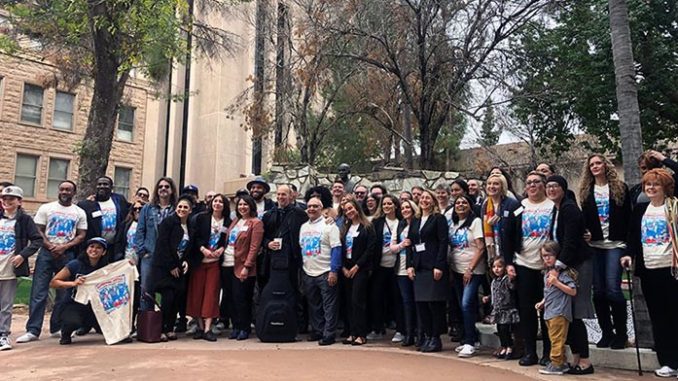
PHOENIX — Criminal reform advocates are asking Arizona legislators to change laws that keep hundreds of formerly incarcerated people from voting or getting jobs.
Activists reached out to lawmakers at the Arizona Capitol on Tuesday as part of a movement they call “Reforming Justice”, saying current laws hobble people who have already served their time for their crimes.
Clyde Hardin, 38, a tattoo artist who was incarcerated for 10 ½ years for armed robbery, said he has applied for dozens of jobs. Time and again, he marked the question on applications that ask whether he ever had been convicted. By the 89th application, the father of three said, he decided to lie to get a job bussing dishes in a restaurant.
“Every application they have to sign, they have that damn box. Every employment, every housing they have that damn box. You have to strike it, you have to say, ‘yeah I’m a convicted felon, but let me explain,’” he said as several advocates met with Secretary of State Katie Hobbs on voting rights.
Hobbs listened to Hardin and others discussed restoring voting rights, saying she appreciated their statements, but did not commit to any specific actions.
Advocates are pushing for the Legislature to model reforms after the Clean Slate Act, recently passed in Pennsylvania, that seals some criminal records.
Rep. Walter Blackman, R-Snowflake, also plans to sponsor a bill to allow prison inmates to be released early from their sentences based on earned credits, according to Tiera Rainey, program coordinator for the Arizona branch of the American Friends Service Committee, which advocates for criminal reform.
Matthew Charles, a former inmate who gained national attention when Kim Kardashian lobbied President Trump to free him over a cocaine convicted more than two decades ago, spoke of trying to become a productive member of society and still having trouble finding a second chance.
He found a job, purchased a truck, attended church and volunteered.
“It’s no longer about rehabilitation, it never was. That went out with the Truth-in-Sentencing Act,” said Charles, who in prison became a librarian and did other work. He was released from prison in 2016 but, nearly two years later a judge forced him to return to serve out his sentence until Kardashian and other supporters lobbied for his release.
The Truth-in-Sentencing Act was passed in 1993 and requires convicted criminals to serve up to 85% of their sentence, according to an Arizona State Senate document.
Hardin said being a convicted felon toys with a person’s humanity.
“You don’t feel that you’re enough, sometimes you feel alone. I had great parents, great friends, great family that all were there for me, to see me succeed. I still felt alone,” he said. “I can’t even fathom some days for dudes who don’t have that. My heart breaks for them, it just does. A clean slate is needed.”
